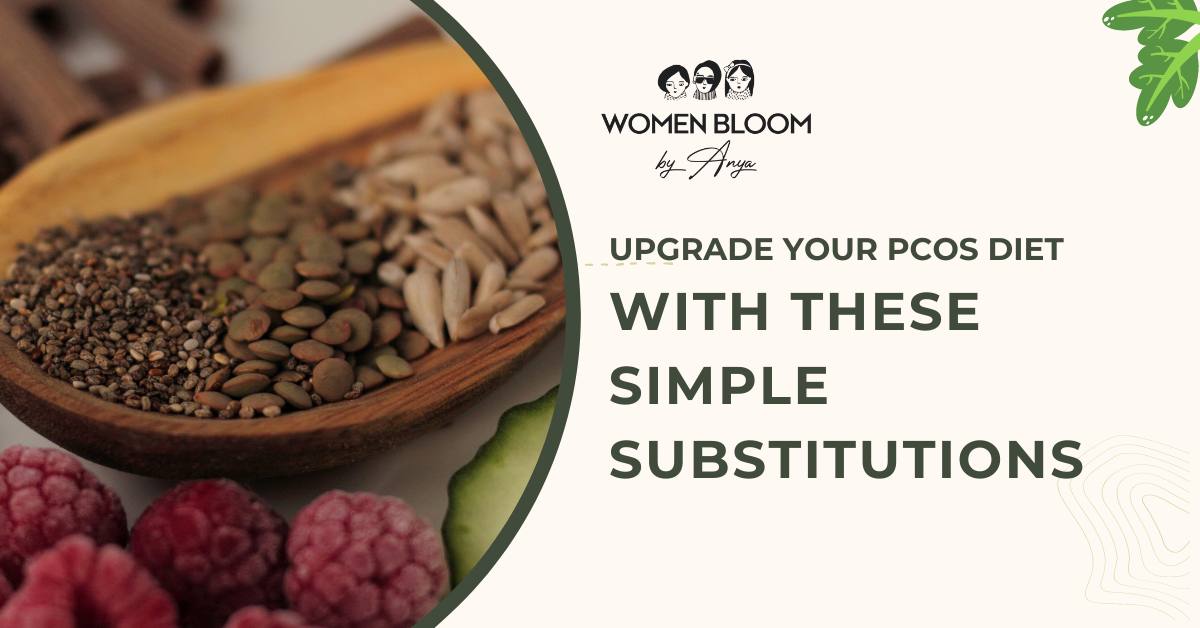
Upgrade Your PCOS Diet with These Simple Substitutions
One of the best management strategies for PCOS is diet. Dietary adjustments can effectively address undesired PCOS symptoms, such as infertility or hair growth, and lower long-term risks, such as diabetes and cardiovascular disease.
This article discusses the significance of nutrition, the best PCOS diet for controlling PCOS, and the foods that should be avoided to manage PCOS.
The Significance of diet for PCOS:
Obesity, persistent inflammation, diabetes or insulin resistance, or a combination of these long-term illnesses are more common in people with polycystic ovarian syndrome.
They all increase the chance of developing diabetes, heart disease, and other ailments.
Although the body produces enough insulin, those with insulin resistance have improper insulin delivery of glucose to the cells.
As a result, glucose accumulates in fat and blood cells, increasing the risk of developing diabetes.
Simple methods to stick to a PCOS eating plan:
It is simple to begin by implementing a few small adjustments to your daily diet. This might entail increasing the amount of fruit, vegetables, whole grains, legumes, nuts, seeds, and lean protein—like chicken and fish—you use in your meals, along with olive oil.
Our nutritionist advises getting started easily:
Replace processed grains with whole grains.
During meals, include one or two servings of fruit or vegetables.
Eat some nuts as a snack.
Fish is a good substitute for red meat.
Avoid meals like red meat, fried dishes, creamy sauces, sweets, and sugary drinks that are rich in saturated fat and/or sugar
Best foods for PCOS:
With lots of nutrients and delicious flavor, you may control your PCOS symptoms and reach a healthy weight by using Mediterranean diet choices like these:
- Baked or grilled fish high in omega-3, like salmon
- Use olive oil rather than margarine or butter.
- Legumes high in protein, such as beans, in place of meat
- Non-starchy veggies include tomatoes, mushrooms, peppers, broccoli, cauliflower, snow peas, celery, and fennel; leafy greens (spinach, kale, escarole, endive, lettuce, etc.)
- whole grains, including sorghum, barley, and brown rice. Whole grain-based breads and pastas can prevent blood sugar increases in PCOS patients.
Which diet is best for someone with PCOS?
You may control your PCOS for the rest of your life by following the diet that makes you the happiest and most comfortable.
Mediterranean diet:
The main component of the Mediterranean diet is eating whole, unprocessed foods—vegetables, fruits, seafood, legumes, nuts, whole grains, and olive oil. A modified, low-carb version of the diet accelerates weight loss in PCOS patients.
- Heavy in nuts and fresh fruit
- limited in carbohydrates (using mainly low-GI carbohydrates with lots of pulses)
may be quite successful in the beginning.
- If your body weight is excessively high, use calorie restriction techniques and make sure your diet is diverse enough to prevent vitamin or mineral shortages.
Only long-term, consistent diets are the ones that can effectively manage PCOS.
Vegetarian diet:
- Consume steady meals all day long. Avoid missing meals and going without food for extended periods of time.
- At every meal, combine complex carbohydrates, protein, and fat:
- Complex carbohydrates: beans, lentils, whole grains, fruits, and vegetables
Diet rich in protein:
- Try to eat Greek yogurt, cottage cheese, edamame, tofu, tempeh, beans, and lentils
- Avocado, nuts, seeds, and olive oil are good fat sources.
- Make sure your grocery list has a wide variety of protein-rich items.
- Prioritize complete, unprocessed foods wherever feasible.
- Reduce the amount of simple carbs you consume regularly. Fruit juices, ordinary soda, white bread, and classic sweets are a few examples.
Keto diet:
If you have PCOS, ketogenic diets can be your best option for losing weight. Carbs are limited by keto to 5% of total calorie intake or less than 30 grams daily.
According to research, the ketogenic diet helps people lose weight, improves liver function, decreases blood sugar, and cycles menstrually. In one research, women with PCOS who followed a ketogenic diet for 12 weeks dropped an average of 20 pounds and more than three points off their BMI.
Seed cycling:
You may eat seeds raw in slightly warm water or grind them up and add them to salads, yogurt, oatmeal, and smoothies.
- Observed Day 1–14: It is preferable to use one tablespoon of each of the flax and pumpkin seeds with breakfast.
- Day 15–28: Have one tablespoon of each sunflower and sesame seeds with breakfast.
The highly suggested seed cycling product is Seed cycling kit by
The particular emphasis of this seed cycling mix kit is the issues associated with hormonal imbalance in the body. As a result, the other problems—such as infertility, irregular periods, hypothyroidism, and mood swings—will resolve themselves right away.
Use herbal teas:
Herbal Teas are a powerful blend of herbs and adaptogens that can help with infertility, irregular periods, hormonal acne, period pains, and weight gain.
You can utilize the Herbal teas. The products contain the right amount of each herb and some roasted ones.
Additionally, these organic teas, which are imported from the UK, help with endometriosis, hair loss, hormone imbalances, premenopause, poor flow, insulin resistance, PMS, and decreased libido.
Food to avoid in PCOS:
These foods might cause inflammation, thus those who have PCOS should stay away from them:
- Foods that are fried (fried chicken or fish, potato chips, corn chips, and French fries)
- Butter and margarine are examples of saturated fats.
- Red meat, such as hot dogs, packaged luncheon meat, roast beef, and hamburgers
- Processed foods, such as pies, cakes, cookies, and candies
- Sugar-laden prepared cereals, such as granola and instant oatmeal
- Sugary liquids, such teas, sodas, and sports drinks
- Alcoholic drinks
- Pasta, pizza crust, white bread, rolls, and refined flour
- White rice
Final words:
Exercise, a balanced diet, and other healthy lifestyle practices, such as getting enough sleep and controlling stress, can all help manage PCOS symptoms, reduce the chance of chronic illness, and enhance overall quality of life.
Adhering to the above-mentioned advice and tricks for living a healthy lifestyle may help you accomplish all of your objectives for controlling PCOS symptoms and maintaining a healthy lifestyle.




